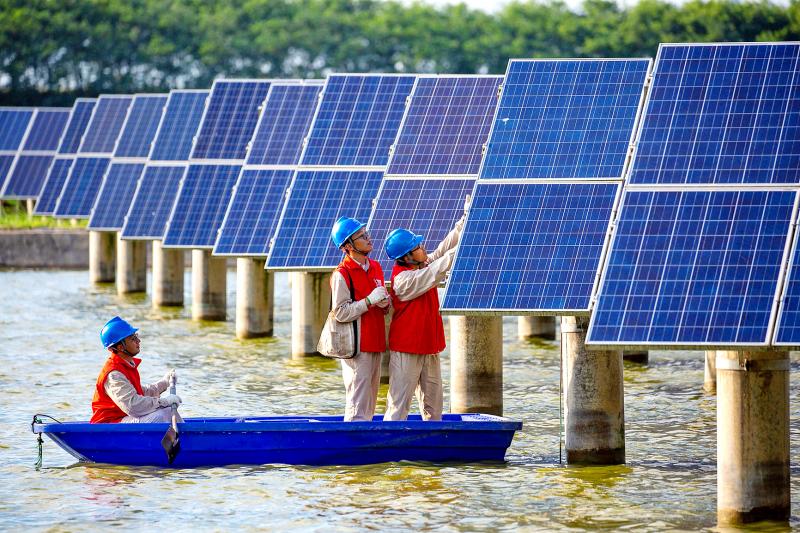Solar power’s rare year of rising costs may get worse thanks to China’s power crisis.
The price of silicon, used to make the material that comprises solar panels, has surged about 300 percent since the start of August after a top-producing province ordered production be slashed amid a power crunch. China dominates global solar production, with its coal generators powering many of the factories that make clean energy equipment.
The move could further fracture the global supply chain that has already been upended by geopolitics, with the US detaining some Chinese imports earlier this year for alleged labor abuses in the nation’s Xinjiang region. It all points to higher prices for solar panels.

Photo: AFP
“It is yet another excuse for polysilicon makers to increase the price, and the pricing environment for solar modules is very nervous at the moment,” solar power researcher Jenny Chase said.
Until this summer, silicon had a rather innocuous history. Made by heating common sand and coke in a furnace, prices ranged between US$1 and US$2.50 per kilogram from 2003 until August. That is when Yunnan Province, one of the top production hubs, announced that as part of its efforts to meet energy targets, production of the metal from last month to December would be cut by 90 percent from August levels.
Silicon is purchased by companies that use caustic chemicals and intense heat to purify it into polysilicon, an ultra-conductive material that helps convert sunlight into electricity in photovoltaic panels.
The price of solar-grade polysilicon jumped 13 percent to US$32.62 a kilogram on Wednesday, the highest since 2011. The material is up more than 400 percent since the start of June last year as soaring solar demand pushed processing plants to capacity.
The impact on solar panels should be smaller. Daiwa Capital Markets analyst Dennis Ip said that panels would rise from from 1.8 yuan (US$0.28) per watt to as much as 2 yuan, bringing them back to mid-2019 prices. Regardless, that could be enough to delay some solar projects as developers wait for prices to fall.
“Solar installations this year are expected to be lower than expectations,” Ip said.

South Korea’s equity benchmark yesterday crossed a new milestone just a month after surpassing the once-unthinkable 5,000 mark as surging global memory demand powers the country’s biggest chipmakers. The KOSPI advanced as much as 2.6 percent to a record 6,123, with Samsung Electronics Co and SK Hynix Inc each gaining more than 2 percent. With the benchmark now up 45 percent this year, South Korea’s stock market capitalization has also moved past France’s, following last month’s overtaking of Germany’s. Long overlooked by foreign funds, despite being undervalued, South Korean stocks have now emerged as clear winners in the global market. The so-called “artificial intelligence

‘SEISMIC SHIFT’: The researcher forecast there would be about 1.1 billion mobile shipments this year, down from 1.26 billion the prior year and erasing years of gains The global smartphone market is expected to contract 12.9 percent this year due to the unprecedented memorychip shortage, marking “a crisis like no other,” researcher International Data Corp (IDC) said. The new forecast, a dramatic revision down from earlier estimates, gives the latest accounting of the ongoing memory crunch that is affecting every corner of the electronics industry. The demand for advanced memory to power artificial intelligence (AI) tasks has drained global supply until well into next year and jeopardizes the business model of many smartphone makers. IDC forecast about 1.1 billion mobile shipments this year, down from 1.26 billion the prior

People stand in a Pokemon store in Tokyo on Thursday. One of the world highest-grossing franchises is celebrated its 30th anniversary yesterday.

Chinese artificial intelligence (AI) start-up DeepSeek’s (深度求索) latest AI model, set to be released as soon as next week, was trained on Nvidia Corp’s most advanced AI chip, the Blackwell, a senior official of US President Donald Trump’s administration said on Monday, in what could represent a violation of US export controls. The US believes DeepSeek will remove the technical indicators that might reveal its use of American AI chips, the official said, adding that the Blackwells are likely clustered at its data center in Inner Mongolia, an autonomous region of China. The person declined to say how the US government received